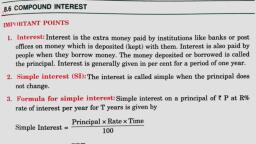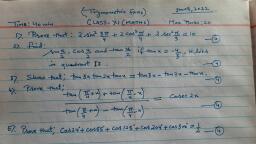Question 4 :
IF $ \displaystyle \Theta $ is any angle, then $ \displaystyle \sec ^{4}\Theta -\sec ^{2}\Theta $ is equal to
Question 5 :
If $\sin x - \cos x = 0$, then what is the value of $\sin^{4}x + \cos^{4}x$?
Question 6 :
value of $ \displaystyle (\cos \Theta +\sin \Theta )^{2}+(\cos \Theta -\sin \Theta )^{2} $ is
Question 7 :
If $3\left( \sec ^{ 2 }{ \theta } +\tan ^{ 2 }{ \theta } \right) =5$, then the general value of $\theta $ is -<br><br>
Question 8 :
If $sin2x-2cosx=0$ .Then the number of values of $\theta$ lying in $[0, \pi]$ is?
Question 9 :
Assume that $\theta$ is rational multiple of $\pi$ such that $\displaystyle \cos \theta $ is a distinct rational. The number of values of $\displaystyle \cos \theta $ is<br>
Question 10 :
If $\alpha, \beta, \gamma, \delta$ are the smallest $+$ive angles in ascending order of magnitude which have their sines equal to a $+$ive quantity $\lambda$ then the value of $4\sin \dfrac{\alpha}{2}+3\sin \dfrac{\beta}{2}+2\sin \dfrac{\gamma}{2}+\sin \dfrac{\delta}{2}=$.
Question 12 :
Assertion: If $x \, \cos \theta = y \, \cos (120^o + \theta) = z \, \cos (\theta + 240^o)$, then $xy + yz + zx = 1$
Reason: $\cos \, \alpha + \cos (120^o + \alpha) + \cos (120^o - \alpha) =0$
Question 17 :
Solve for x, $\sqrt{13 -18\tan x}=6\tan x - 3$, where $-2\pi < x <2\pi$.<br>
Question 19 :
The value of $\tan 27 \tan 31 + \tan 32 \tan 31 +\tan 31 \tan 27 $ is
Question 20 :
A value of $\theta$ in the interval $(-\dfrac {\pi}{2},\dfrac {\pi}{2})$ satisfying the equation $(1 - tan \theta) (1 + tan \theta) sec^2 \theta + 2 tan^2 \theta + 2 = 0$ is
Question 23 :
If $ \sin { \theta } +\cos { \theta }=p$ and $ \tan { \theta +\cot { \theta =q } } $ then $q\left (p^{2}-1\right )=$<span><br></span>
Question 24 :
The number of real roots of the equation $\displaystyle \cos ^{2}x+\sin ^{4}x=1$ in the interval $\displaystyle (-\pi ,\pi)$ are <br/>
Question 25 :
If $0\le x\le 2\pi $, then the number of solutions of the equation $\sin ^{ 6 }{ x } +\cos ^{ 6 }{ x } =1$ is
Question 26 :
Solution set of the equation $\sin ^{ 2 }{ x } +\cos ^{ 2 }{ 3x }$ =1$ is given by
Question 27 :
What is the simplified value of ${ \left( \cfrac { \sec { A } }{ \cot { A } +\tan { A } } \right) }^{ 2 }$
Question 28 :
If $\displaystyle x\cos A=1$ and $\displaystyle y=\tan A,$ then $\displaystyle x^{2}-y^{2}$ is<br>
Question 29 :
An extreme value of $4sin^2x+ 3 cos^2x- 24 sin \dfrac{x}{2}-24 cos\dfrac{x}{2}, $ where $0 \leq x \leq \dfrac{\pi}{2}$, is
Question 31 :
Let $\alpha ,\beta $ be such that $\pi <\alpha -\beta <3\pi $. If $\sin { \alpha } +\sin { \beta } =-\cfrac { 21 }{ 65 } $ and $\cos { \alpha } +\cos { \beta } =-\cfrac { 27 }{ 65 } $, then the value of $\cos { \cfrac { \alpha -\beta }{ 2 } } $ is
Question 33 :
One of the principal solutions of $ \sqrt3 \sec x = - 2 $ is equal to :
Question 34 :
In a triangle $ABC$, $a- 2b +c = 0$. The value of $\cot \left(\dfrac{A}{2}\right) \cot\left(\dfrac{C}{2}\right)$ is
Question 37 :
If $\displaystyle \frac{1}{6} \sin x, \cos x, \tan x$ are in G.P. then $x =$<br><br>
Question 38 :
Let A and B denote the statements<br/>A: $cos\,\theta_1 + cos \,\theta_2+cos \,\theta_3 =0$<br/>B: $sin\,\theta_1 + sin\,\theta_2 + sin\,\theta_3 = 0.$<br/><div>If $cos (\theta_1 - \theta_2) + cos (\theta_2 - \theta_3) + cos (\theta_3 - \theta_1) = \displaystyle \frac{-3}{2}$</div><div>Then which one of following is correct ?<br/></div>
Question 39 :
The real roots of the equation $cos^7 x + sin^4 x = 1$ in the interval $(-\pi, \pi)$ are ..... and ...........
Question 40 :
The number of solution of $\cos { \theta } =\left| 1+\sin { \theta } \right| ,0\le \theta \le 3\pi $ is
Question 41 :
If $\displaystyle \sin x+\sin ^{2}x=1$ then the value of $\displaystyle \cos ^{8}x+2\cos ^{6}x+\cos ^{4}x$ is
Question 42 :
Let a,b and c be the three sides of a triangle, then find the number of real roots of the equation $\displaystyle b^{2}x^{2}+(b^{2}+c^{2}-a^{2})x+c^{2}= 0 $<br/><br/>
Question 43 :
If $ f\left ( x \right )= \sin x, \:g\left ( x \right )= 1+x^{3} $, then $ \left ( fog \right )\:\left ( x \right ) $ equals
Question 44 :
The general solution of the equation $\sin { \theta } +\cos { \theta } =1$ is
Question 45 :
Find the principal and general solutions of the following equation: <div>$\sec x = 2$</div>
Question 46 :
The general solution of the equation $\tan ^{ 2 }{ x } =1$ is
Question 47 :
Assertion (A): lf $\tan\alpha, \tan\beta$ are the roots of $x^{2}+px+q=0$, then $\tan(\alpha+\beta)=\dfrac{p}{1-q}$<br/>Reason (R) : lf $\alpha, \beta$ the roots $ax^{2}+bx+c=0$, then $\displaystyle \alpha+\beta=\frac{-b}{a}$ and $\alpha\beta= \dfrac{c}{a}$ <br/>
Question 48 :
The set of values of $x$ for which $\displaystyle \frac{\tan 3x-\tan 2x}{1+\tan 3x\tan 2x} = 1$ is
Question 49 :
If $ A+B+C = 180^o , $ then the value of $ ( \cot B + \cot C ) ( \cot C + \cot A ) ( \cot A + \cot B ) $ will be :
Question 50 :
If <span>$\sin A\cos B=\dfrac{1}{\sqrt 2}$ and</span><span> </span><span>$\sin B\cos A=-\dfrac{1}{2\sqrt 3}$,</span><span> then $\sin\left( {A - B} \right) = $ </span><div><br/></div>
Question 51 :
If $\displaystyle \sin x+\cos \sec x=2,$ then $\displaystyle \sin ^{n}x+\cos \sec ^{n}x$ is equal to
Question 52 :
Principal solutions of the equation $\sin 2x+\cos2x=0$, where $\pi < x < 2\pi$ are
Question 53 :
The general solution of the equation $\displaystyle 2\cot \frac{\theta }{2}=\left ( 1+\cot\theta \right )^{2}$ is<br>
Question 54 :
The expression $\displaystyle \frac{\sin ^{4}t+\cos ^{4}t-1}{\sin ^{6}t+\cos ^{6}t-1}$ when simplified reduces to .......................<br>
Question 56 :
The sum of the roots of the equation $4\cos^3 (\pi + x) - 4 \cos^2 (\pi - x) + \cos (\pi + x) - 1= 0$ in the interval $[0, 320]$ is p$\pi$ where p is equal to
Question 57 :
Solve the equation $\displaystyle 2^{\cos x} 3^{\sin y} = z^2 - 2z + 7$.<br/>Then find the value of $x+y+z$
Question 58 :
If $\tan x - \tan^{2} x = 1$, then the value of $\tan^{4} x - 2 \tan^{3} x - \tan^{2} x+2\tan x +1$ is:
Question 59 :
If $\displaystyle a<c $ in $\displaystyle \Delta ABC,$ then sum to infinite terms of the series $\displaystyle n\frac{a}{c}\sin B +\frac{n(n+1)}{2!} \frac{a^{2}}{c^{2}}\sin 2B+.....\infty$ is equal to<br>
Question 60 :
The value of $\sin \left (\dfrac {\pi}{18}\right ) \sin \left (\dfrac {5\pi}{18}\right )\sin \left (\dfrac {7\pi}{18}\right )$ is:
Question 61 :
Solve : $\cos(\pi .\: 3^x)-2\cos^2(\pi .\: 3^x)+2\cos(4\pi .\: 3^x)-\cos(7\pi .\: 3^x)$<br> $\sin (\pi .\: 3^x)+2\sin ^2(\pi .\: 3^x)-2\sin (4\pi .\: 3^x)+2\sin(\pi .\: 3^{x+1})-\sin (7\pi .\: 3^x)$<br>
Question 62 :
if $\displaystyle 0<\theta <90^{\circ}$ and $\displaystyle \frac{\sin \theta }{1 - \cos \theta }+\frac{\sin \theta }{1+\cos \theta }=4,$ then the value of $\displaystyle \theta $
Question 63 :
If $\alpha, \beta$ are solutions of $\sin^{2}\mathrm{x}+ a\sin x +\mathrm{b}=0$ and $\cos^{2}\mathrm{x}+ c\cos x +\mathrm{d}=0$ then $\sin(\alpha+\beta)$<br/>equals<br/>
Question 64 :
$\displaystyle \frac{\sin 3 \alpha}{\cos 2 \alpha} < 0$, if $\alpha$ lies in
Question 65 :
Consider the cubic equation ${ x }^{ 3 }-\left( 1+\cos { \theta } +\sin { \theta } \right) { x }^{ 2 }+\left( \cos { \theta } \sin { \theta } +\cos { \theta } +\sin { \theta } \right) x-\sin { \theta } \cos { \theta } =0$<br>whose roots are ${ x }_{ 1 },{ x }_{ 2 },{ x }_{ 3 }$<br>The greatest possible difference between two of the roots if $\displaystyle \theta \epsilon \left [ 0,2\pi \right ]$ is<br><br>
Question 67 :
If $\cos x= \tan y, \cot y = \tan z$ and $\cot z = \tan x$; then $\sin x = $
Question 68 :
Simplify: $\tan5\tan { 30 } \times 4\tan { 85=\_ \_ \_ } $
Question 69 :
The most general value of $\theta$ satisfying $3-2 \cos\theta -4 \sin\theta -\cos2\theta+\sin 2\theta=0$:
Question 70 :
If $4\sin ^{4}x+\cos ^{4}x=1$,then x is equal to $\left ( n\in Z \right )$
Question 71 :
The most general solutions of the equation $\sec x-1=\left ( \sqrt{2}-1 \right )\tan x$ are given by
Question 72 :
If $(cosec^{2}\theta -4)x^{2}+(cot\theta +\sqrt{3})x+cos^{2}\frac{3\pi}{2}=0$ holds true for all real x, then the most general values of $\theta$ can be given by $(n\in z)$
Question 73 :
The number of solutions of $\displaystyle \left [ \sin x+\cos x \right ]=3+\left [ -\sin x \right ]+\left [ -\cos x \right ]$(where $\displaystyle \left [ \right ]$ denotes the greatest interger function),$\displaystyle x\epsilon \left [ 0,2\pi \right ]$ is<br>
Question 74 :
If $\cos { \alpha } +\cos { \beta } +\cos { \gamma } =\sin { \alpha } +\sin { \beta } +\sin { \gamma } =0$, then the value of $\cos { 3\alpha } +\cos { 3\beta } +\cos { 3\gamma } $ is
Question 75 :
A solution of the equation $5 \sin^2x+3 \sin x \cos x -3 \cos^2x=2$ is-
Question 76 :
The equation $\displaystyle 4\sin (x + \frac{\pi}{3}) \cos (x - \frac{\pi}{6}) = a^2 + \sqrt{3} \sin 2 x - \cos 2x$ has a solution if the value of a is
Question 77 :
If $sin^2A=x$then sin 3A. sin A is polynomial in x, whose degree is equal to <br/>
Question 78 :
If $\displaystyle \sum_{n = 1}^{2013} \tan \left (\dfrac {\theta}{2^{n}}\right )\sec \left (\dfrac {\theta}{2^{n - 1}}\right ) = \tan \left (\dfrac {\theta}{2^{a}}\right ) - \tan \left (\dfrac {\theta}{2^{b}}\right )$ then $(b + a)$ equals
Question 80 :
If the sides of a right-angled triangle are in G.P., then the cosines of the acute angle of the triangle are
Question 81 :
If $2 \sin \alpha \cdot \cos \beta \cdot \sin \gamma = \sin \beta \cdot \sin (\alpha + \gamma )$, then $\tan \alpha ,\tan \beta, \tan \gamma$ are in
Question 82 :
If $\sec\theta +\tan\theta =1$, then a root of the equation $(a-2b+c)x^{2}+(b-2c+a)x+(c-2a+b)=0\;\; $ is
Question 83 :
Solve for $x, (- \pi \leq x \leq \pi)$, the equation $2 (cos x + cos 2x) + sin 2x (1 + 2 cos x) = 2 sin x$
Question 84 :
<div><span>If $\alpha, \beta, \gamma, \delta$, are the solution of the equation $\tan \left (\theta + \dfrac {\pi}{4}\right ) = 3 \tan {3}\theta$, no two of which have equal tangents.</span><br/></div><div><br/></div>The value of $\displaystyle \tan \alpha + \tan \beta + \tan \gamma + \tan \delta$ is<br/>
Question 85 :
If $\sin^{2}x-2\sin x - 1=0$has exactly four different solution in $x\in [0, n\pi]$, then value / values of n is / are $(n \in N)$
Question 88 :
<p>Given that Tan A, Tan B are the roots of the equation ${x^2} - bx -c = 0$ then<br/>the value of <span>${\sin ^2}\left( {A + B} \right)$ is</span></p>
Question 90 :
The number of solutions of the equation $\sin { x } =\cos { 3x } $ in $\left[ 0,\pi \right] $ is
Question 91 :
The general solution of the equation ${\sin ^{100}}x - {\cos ^{100}}x = 1$ is-
Question 93 :
Assertion: Statement 1: $\displaystyle \sin x= a$ where $\displaystyle -1< a< 0$ then for $\displaystyle x\epsilon [0,n\pi ]$ has $2(n-1)$ solutions $\displaystyle \forall n\epsilon N$
Reason: Statement 2: $\sin x$ takes value $a$ exactly two times when we take one complete rotation covering all the quadrant starting from $\displaystyle x= 0$
Question 95 :
For which values of $a$ does the equation $4 sin(x+\dfrac{\pi }{ 3})cos(x-\dfrac{\pi }{ 6})=a^{2}+\sqrt{3}sin2x-cos2x$ have solutions? Find the solutions for $a=0$, if exist.
Question 97 :
In a triangle $ABC$, $\angle B < \angle C$ and the values of $B$ & $C$ satisfy the equation $2 tan x-k (1+tan^2x)=0$ where $(0 < k < 1)$. Then the measure of $\angle A$ is:
Question 98 :
If $a \sin^{2} x + b\cos^{2} x = c, b\sin^{2}y + a\cos^{2}y = d$ and $a\tan x = b\tan y$, then $\dfrac {a^{2}}{b^{2}}$ is equal to
Question 99 :
If $\sin\alpha =p, |p|\leq 1$ then the quadratic equation whose roots are $\displaystyle \tan\frac{\alpha }{2}$ and $\displaystyle \cot \frac{\alpha}{2}$ is:
Question 101 :
The number of solutions of the equation, $\displaystyle \frac{\tan 3x}{\tan x}=2$ is
Question 102 :
The solution of the equation $\displaystyle \sin ^{4}x+\cos ^{7}x= 1$ is given by $\left ( \forall \: k \: \epsilon\: l \right )$
Question 104 :
For the smallest positive values of $x$ and $y$, the equation $2 ( \sin x + \sin y) - 2 \cos (x - y) = 3$ has a solution, then which of the following is/are true?
Question 105 :
Find all values of $\theta$ satisfying the equation $\sin\! 7\theta = \sin\! \theta + \sin\! 3\theta , \:where \:0 \leq \theta \leq \pi $.<br>
Question 106 :
The value of $x$ in $(0, \pi/2)$ satisfying $\dfrac{\sqrt3 - 1}{\sin x} + \dfrac{\sqrt3 + 1}{\cos x} = 4\sqrt2$ is
Question 107 :
In a $\triangle ABC,$ the angles $A$ and $B$ are two different values of $\theta$ satisfying $\sqrt { 3 } \cos { \theta } +\sin { \theta } =k,\left| k \right| <2.$ The triangle:















































